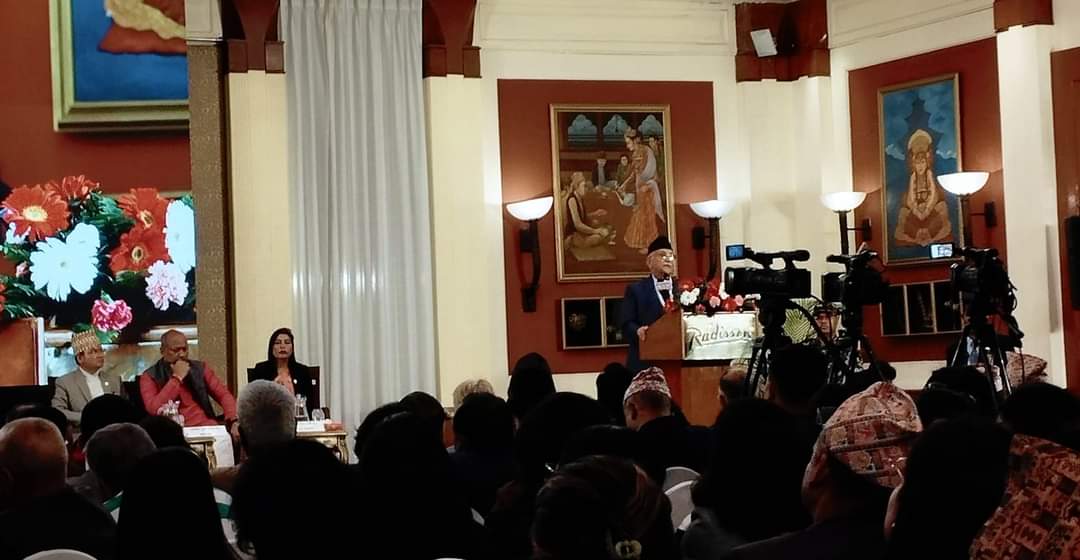Kathmandu, 26 October 2024 – The National Climate Summit 2024 was held today in Kathmandu, bringing together Nepal’s leaders, international representatives, and environmental advocates to address the country’s pressing climate issues. With a focus on elevating these concerns to the global stage at COP29, the summit concentrated on critical areas such as loss and damage, the protection of mountain ecosystems, and the urgent need for climate finance.

Prime Minister KP Sharma Oli opened the summit with a compelling call for action, stressing Nepal’s unique vulnerability to climate change. The Prime Minister highlighted how the nation’s mountains, glacial lakes, and diverse ecosystems are at risk due to rising temperatures and erratic weather patterns. He emphasized the need for international recognition and support for Nepal’s role as a custodian of the Himalayas, urging global leaders to prioritize climate finance and loss and damage compensation.
Addressing Loss and Damage for Vulnerable Communities
The discussion on loss and damage focused on the increasing toll of climate-induced disasters in Nepal, including glacial lake outburst floods, landslides, and flash floods. Minister for Forest and Environment Eain Bahadur Shahi Thakuri underlined the disproportionate impact of these events on vulnerable communities, calling for stronger support mechanisms from developed nations. He stressed that loss and damage should be a core agenda at COP29, advocating for a dedicated fund that compensates countries like Nepal for the irreversible damages caused by climate change.
Mountain Ecosystems: A Global Priority
As a nation with some of the world’s most iconic mountains, Nepal faces unique challenges in preserving its fragile high-altitude ecosystems. Chairperson Bhim Prasad Dhungana from the Nepal Municipal Association emphasized the importance of protecting these ecosystems, which not only hold cultural and environmental significance for Nepal but also act as critical water sources for millions across South Asia. He urged international policymakers to include mountain ecosystem protection in global climate agreements, recognizing these regions’ vulnerability to warming temperatures and their critical role in regional water security.
UN Resident Coordinator Hanaa Singer-Hamdy also addressed the summit, advocating for mountain ecosystems to be prioritized in global climate discussions. She praised Nepal’s commitment to conservation and emphasized the need for international partnerships that could bolster mountain resilience programs.
Calls for Increased Climate Finance
Climate finance emerged as a key issue, with summit participants calling for substantial financial support to address Nepal's adaptation needs. Dr. Dipak Kumar Kharal, Secretary of the Ministry of Forests and Environment, highlighted that Nepal requires significant funding to implement adaptation measures, enhance resilience, and reduce climate vulnerability. He urged wealthier nations to fulfill their financial commitments, noting that countries like Nepal contribute minimally to global emissions yet bear some of the worst impacts of climate change.
Dr. Kharal emphasized that climate finance is essential not only for immediate adaptation but also for long-term sustainable development. He stressed that Nepal’s COP29 agenda would strongly advocate for transparent and accessible funding mechanisms that prioritize vulnerable countries.
Legal Perspectives and Regional Commitments
Supreme Court Justice Sapana Pradhan Malla added a legal perspective, discussing the importance of enforceable climate laws to protect natural resources and ensure accountability. She emphasized the need for legal frameworks that incorporate climate justice, ensuring that vulnerable communities receive support and protection under the law.
Chief Minister Satish Kumar Singh of Madhesh Pradesh spoke on regional environmental challenges, such as deforestation and water pollution, which are exacerbated by climate change. He underscored the need for provincial cooperation to complement national policies, ensuring that local initiatives align with broader climate goals.
In his closing remarks, Minister Thakuri reiterated Nepal’s commitment to pushing for loss and damage funding, climate finance, and mountain ecosystem protection at COP29. He called for unity among government bodies, local communities, and international partners to ensure Nepal’s environmental priorities are addressed at the global level.
Summit’s Role in Shaping COP29 Agenda
The National Climate Summit 2024 provided a critical platform for Nepal to prepare its position for COP29. The summit’s focus on loss and damage, mountain ecosystems, and climate finance reflects Nepal’s urgent need for international support to combat climate challenges. As Nepal prepares to advocate for these issues at COP29, it calls on the global community to recognize and support its role in preserving one of the world’s most vulnerable and ecologically valuable regions.